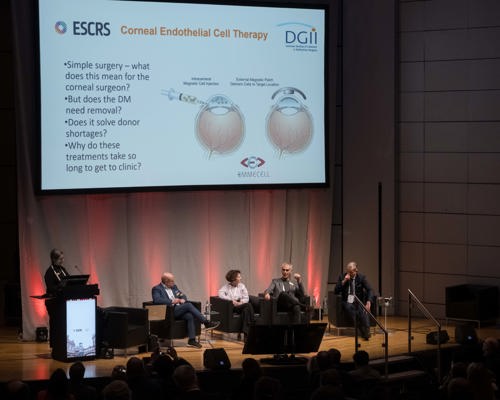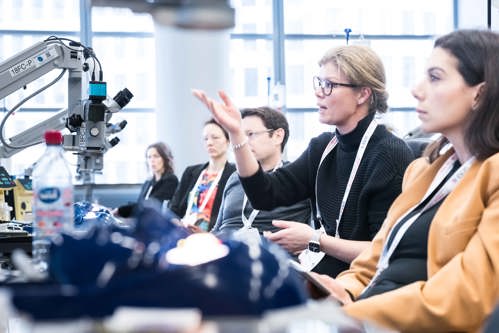Inside ESCRS
With Eyes on Its Future, ESCRS Celebrates Its Past
Winter Meeting offers opportunities to experiment with new concepts and formats.

Stuart Hales
Published: Monday, April 1, 2024
As expected, education took centre stage at the 2024 ESCRS Winter Meeting in Frankfurt, Germany, with sessions on topics ranging from strategies and techniques for IOL exchange to future applications of femtosecond lasers. But away from the presentation halls and meeting rooms, new learning and networking concepts were being tested, ESCRS leaders were attending a workshop on implicit bias, and veteran ophthalmologists were sitting for interviews that explored the Society’s heritage and especially its roots in intraocular implantation surgery.
The new concepts were less structured and more intimate than traditional conference sessions. For example, “World Café” roundtable discussions allowed attendees to talk informally with experts about dysphotopsia and glare, making decisions during refractive surgery, and dealing with low astigmatism. “Unconference” presentations were 15-minute talks that addressed topics such as performing good and safe cataract surgery with fewer materials, the psychological nature of functional vision, understanding unconscious biases, and enhancing patient satisfaction through evidence-based strategies.
Meanwhile, EuroTimes editor-in-chief Sean Henahan sat down with former ESCRS President Thomas Neuhann, Richard Packard, and Hans-Reinhard Koch to discuss the development of the intraocular lens and their respective roles in witnessing and furthering its acceptance. The interview was part of a larger project highlighting the rich history of ESCRS and the Society’s contributions to ophthalmology.
Reaching new audiences
The juxtaposition of familiar and innovative programming created an atmosphere of calculated innovation, a sense that ESCRS has a tried-and-true formula that has served it well but wants to explore new ideas and appeal to new audiences. Increasingly, these audiences are global in terms of both location and mindset.
“The vision of ESCRS encompasses both expansion and preservation,” said ESCRS President Filomena Ribeiro MD. “We are embracing new audiences while upholding our European heritage and fostering a global community united in scientific advancement.”
The global emphasis was evidenced by the presence of the Brazilian Association of Cataract and Refractive Surgery (BRASCRS) in the exhibition hall. Dr Ribeiro will lead an ESCRS delegation to Rio de Janeiro in late May to present a session at the 2024 BRASCRS Congress of Cataract and Refractive Surgery. Other scheduled destinations for ESCRS delegation visits in 2024 include Indonesia, China, Canada, and South Africa.
While most Winter Meeting attendees hailed from Germany—the event was held in cooperation with the German Society for Cataract & Refractive Surgery—more than 70 countries were represented, from as far away as South America (Chile and Brazil), Asia (Indonesia and China), Western Africa (Côte d’Ivoire), and Australasia. Notwithstanding their geographic and cultural diversity, attendees found common cause in their desire for professional development.
Of particular interest were hands-on training opportunities such as the wet labs, which addressed procedures such as iris reconstruction, suturing techniques, and basic phacoemulsification. The Winter Meeting’s 12 wet labs drew 120 participants, mostly trainees and residents eager to learn new techniques but also some more experienced surgeons interested in honing their skills.
Another popular attraction at the Winter Meeting was the moving simulator, an ESCRS project launched in 2023 that sends a surgical simulator to European countries with limited access to such equipment and provides opportunities for students to schedule up to 8 hours to conduct an ESCRS-developed curriculum. The simulator was available in the exhibition hall during the Winter Meeting and was occupied continually by students wanting to develop their skills.
Engaging younger professionals
The Winter Meeting also reinforced the Society’s commitment to diversity and inclusion and to sustainable surgical practices. More than one-third (36%) of presenters and panellists were women, and ESCRS aims to increase that share to 40% at future meetings. Meanwhile, the ESCRS booth in the exhibition hall included a display promoting SIDICS (Sustainability Index for Disposables in Cataract Surgery), a tool for evaluating the sustainability of customised cataract packs used by hospitals and surgical centres. Attendees who visited the display and listened to a presentation about SIDICS received an ESCRS-branded surgical cap.
Also available in the exhibition hall were guided tours led by members of the ESCRS Executive Board. The tours allowed first-time attendees to gain insights and knowledge from veteran ophthalmologists while exploring the latest advancements from industry vendors.
With its new approaches to education and networking and its nod to sustainability, the Winter Meeting offered several opportunities to engage younger professionals and invite them to join the ESCRS community. The upcoming Annual Congress in Barcelona will allow ESCRS to try these concepts on a larger scale and perhaps debut more innovations.
“Let’s ignite curiosity with novel approaches and entice younger audiences to return eagerly,” Dr Ribeiro said. “May our endeavours beckon them to Barcelona this September.”